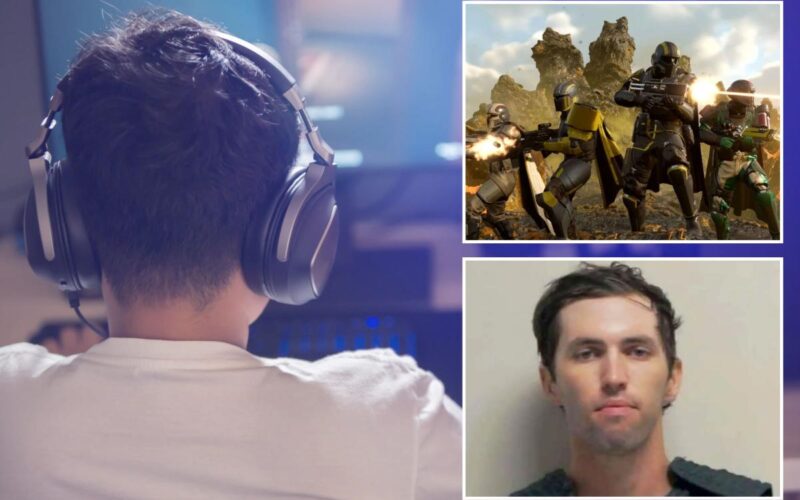On the computer screen, a campy-looking pirate jiggles his left leg impatiently, swigging occasionally from a tumbler of rum. In front of him, dark skies pour rain above a swirling sea. The pirate jumps into a boat and heads into the waves — getting ready to attack and board a rival ship.
The soundtrack to this digital drama is a constant, giggling commentary by a young goateed man — talking into a microphone and wearing a pair of headphones over a baseball cap.
HitboTC (“Gamer, family man and full-time nerd,” according to his social media bio) is simultaneously playing pirates with his friends — on the wildly popular “Sea of Thieves,” which has reportedly sold 1.8 million copies on PlayStation alone since it launched last year — all while communicating with the other players via his headset. He’s also livestreaming the whole thing on the online platform Twitch — where he has 194,000 followers on the platform.
And after he finishes his session, HitboTC will log onto the messaging platform Discord, where he’ll discuss his moves.
“Sea of Thieves” — a game in which the player assumes the role of a pirate adventuring the high seas, plundering and pillaging, and conducting daring raids — has around 12.4 million players worldwide, logging in for an average of 20 hours per week.
Before reportedly confessing to shooting conservative speaker and activist Charlie Kirk in a Discord chat channel in September, Tyler Robinson was one of those players.
Now, agents from the Secret Service and the FBI are studying Robinson’s behavior and online activity — in hopes of building a profile of the 22-year-old that might explain how he allegedly came to do what he says he did.
The world of computer games and Discord has come into sharp focus recently. Thomas Crooks, who shot President Donald Trump at a Pennsylvania campaign rally in July 2024, was well-known to Discord users, as was 14-year-old Georgia school shooter Colt Gray, who detailed his plans for the 2024 attack on the site.
And Tomas Kaan Jimenez-Guzel and Milo Sedarat, the 19-year-olds from tony Montclair, NJ, arrested just last week in connection with an apparent ISIS-inspired terror plot for a Halloween massacre, were part of a wider international network of young men — connected through Discord and other online radicalization pipelines.
Is gaming culture a driving factor in the motivations of Robinson and others? And what is really happening on these platforms?
Game boys
For many, the word “gamer” still conjures up an image of a lone, socially awkward teenage boy hiding away from society in his bedroom — even though annual revenue from the worldwide gaming market was estimated at almost $455 billion and climbing in 2024, according to Forbes.
Clearly now a mainstream pastime, the multi-layered world of multiplayer online universes remains a mysterious entity to people like me — even as a mother of three boys, all avid gamers often found glued to the PlayStation while conversing with their friends via headsets.
As a 44-year-old woman who would always rather pick up a book than a game controller, I recently decided to dive into this foreign world for myself. I wanted to see how it acts as a place for people to play, socialize, communicate — and, sometimes, get sucked into a deep, dark and dangerous place.
That world — including what one researcher called “gaming adjacent platforms,” like Discord — can be an inherently frightening one. It’s a space where radicals can prey on vulnerable users, seemingly unchecked, to recruit and radicalize them.
“Extremists and predators go to these gaming spaces to find highly-engaged, susceptible young people, many of whom are yearning for connection,” Mariana Olaizola Rosenblat, a policy advisor on tech and law at the New York University Stern School of Business, told Axios following the release of their recent study on exploitation in the gaming sphere.
Hell-diving in
I decided to start with one of Tyler Robinson’s other favorite games, “Helldivers 2,” on which he logged 399 hours playing, according to his Steam profile — I chose it because this one was said to have inspired the phrases the alleged sniper reportedly engraved onto his bullets.
Essentially, this is an online, satirical version of the 1997 film “Starship Troopers,” set in the 22nd century, where an Earth-based military, the Helldivers, is engaged in an interstellar war against an alien species, fighting to spread “managed” democracy.
If it sounds complicated, you wouldn’t be wrong.
“You can play it alone, but by and large it’s a game that lives or dies on you playing it with friends,” said 35-year-old Ira Donaldson (who prefers to go by a pseudonym). He told me he’d spent years playing games like this one, “It’s very chaotic, very funny, and sort of slapstick in that it’s very easy to die accidentally.”
One of the bullet markings Robinson reportedly chose was a sequence of arrows that users input to call in a space-based weapon during play.
The use of the reported phrase “Hey fascist! Catch!” was a sick inside joke, Donaldson explained to me. The apparent conceit of “Helldivers 2” is that you’re playing as a faceless, easily-replaceable soldier in a fascist society in a vast, fascist war machine, Donaldson said. In this world everyone is indoctrinated to be believe they are not the fascists — but rather, the upholders of democracy.
Interestingly, called “Helldivers is a “broadly political, left-wing game” — one that “feels very satirical about American society.” He said it’s “a critique of propaganda and imperialism.
“The things you’re trying to defend are very American-coded — white picket fences and so on. [But] it is continually implied that the society you are defending — the ‘democracy’ — is actually s–t.”
Discovering Discord
But the game itself isn’t necessarily the danger zone — it’s when the conversation moves over to Discord, as it so frequently does, that things begin to feel strange.
Anyone unfamiliar with online culture can’t help but be creeped out by a quick glance at the various Discord channels, or “servers,” for “Helldivers 2” — which have highly militarized names like the “Death Korps of Malevelon Creek.” The “55th Hell Battalion” has a sinister symbol: a blood red, winged skull. The “505th Resurgence Regiment” has chosen a skull over a golden eagle.
I signed up to the 1st Colonial Regiment — tagline: “The Tip of the Spear” — but before I could do so, I was faced with a long list of rules, including ones about avoiding “edgy” humor and excessive emoji use and banning “illegal, harmful or unsafe material” as well as “political /religious/other sensitive debates,” among other regulations. I could report a player if I had a concern.
I also managed to sign up to the Death Korps of Malevelon Creek, at which point I was plunged into a mysterious world in which High Command invited me to democratic conversation. I was regularly updated on patch notes (I’m still unclear exactly what they are), and I was offered the opportunity to invest in a Legendary Warbond that will apparently make me invincible.
I’m clearly not the target demographic for this game — and it really did feel like an alien world. Half the time, I had no idea what my fellow gamers were talking about, or the layers of meaning behind certain comments.
Which in itself means that a lot of what is happening in these forums is potentially dangerously indecipherable, especially to parents. I wasn’t expert enough to decode whether it was just game play, or more concerning.
But, in my opinion, the real problem is that the platforms themselves are often murky. They are hybrid-regulated, with an overall light touch by Discord itself, and individual channels and servers moderated by the individual users who set them up.
“Discord does have a fairly high risk profile. It’s pretty opaque by nature,” acknowledged Jacob Davey, director of policy and research for counter-hate at the Institute for Strategic Dialogue, a think tank.
“Beyond [the shooting of] Kirk, we’ve seen it as relevant to incidents relevant to national security, and we’ve also seen it being quite central to a number of what we call the ‘true crime community’ — young people obsessed with school shootings who want to commit them. It plugs into the dark underbelly of nihilistic youth subcultures.”
For its part, Discord insists it is working to counteract this.
“The actions of extremist groups or extremism behavior have no place on Discord or anywhere in society,” a Discord spokesperson told me.
“We’re committed to user safety and have dedicated teams working to disrupt these networks, remove violative content, and take action against bad actors on our platform. We invest heavily in advanced safety tools and proactive detection systems, and we continuously seek to strengthen these measures. Discord has reported extremist groups and individuals to law enforcement, with our reports playing a material role in prosecution and jail sentences for bad actors.”
But, added Davey, the platform “is quite difficult to research because you need to be plugged into the community to access it.”
However, a report by the Institute for Strategic Dialogue, which tracks violent extremism in the United States, found 24 extremist servers on Discord, 100 such channels on the livestreaming service DLive, 91 channels on Amazon-owned Twitch, and 45 public groups on Steam.
The Post has reached out to DLive, Twitch and Steam for comment.
And while those numbers were associated largely with the far right, this year, for the first time in more than 30 years, left-wing violence in the United States has exceeded right-wing violence, according to a recent report from the Center for Strategic and International Studies.
It’s worth noting that Robinson, according to his mother, had started to lean more to the left, “becoming more pro-gay and trans-rights orientated,” Utak County Attorney Jeff Gray told a news conference last month.
‘There is something unique about gaming culture’
There’s little doubt that boys are disproportionately drawn to the social world offered by online spaces, which offer a way of avoiding the awkwardness and social anxiety of the real world. Discord, particularly, skews heavily male, with more than 65% of users being boys and men.
As Donaldson puts it, “If you’re in a video gaming community, you may fit in less well [in] the normal social context. Disproportionately, these are young men; disproportionately, they are neurodivergent, so may be rubbing up against the normative world awkwardly.”
“Overwhelmingly, the research points to games being spaces that provide companionship and friendship,” psychologist Rachel Kowert, who specializes in the uses and effects of digital games, told me. “But there is something unique about gaming culture.”
Misogyny in particular is embedded into this world, says Kowert, and as the sociologist Cynthia Miller-Idriss has explored in her new book, “Man Up: The New Misogyny and the Rise of Violent Extremism,” misogyny is a demonstrated precursor and occasional mobilizer of mass violence.
“It’s not necessarily the gaming that makes them hate, but they are people who hate, and gaming enables them to communicate with each other,” Davey said.
“The online world — Discord, Reddit, Steam — contains all that you can imagine,” said Donaldson. “Radicalized groups; political extremist groups; all sorts. All we know is that the possibility is there.”
After weeks delving into this world it’s clear to me that the murky nature of the forums should raise alarm bells. And the platforms themselves need to step up. Much stricter regulation will be needed if we’re going to prevent this alarming rise in political and mass violence.








